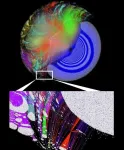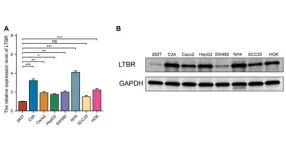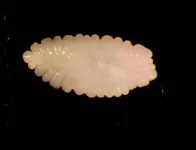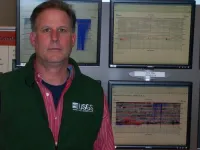Predicting and controlling bad-actor AI activity in a year of global elections
As the U.S. and other countries gear up for elections, a new study predicts an escalation of daily, bad-actor activity driven by AI by mid 2024
2024-01-23
(Press-News.org) MEDIA CONTACT:
Cate Douglass; cdouglass@gwu.edu
More than 50 countries are set to hold national elections this year and analysts have long sounded the alarm on the threat of bad actors using artificial intelligence (AI) to disseminate and amplify disinformation during the election season across the globe.
Now, a new study led by researchers at the George Washington University predicts that daily, bad-actor AI activity is going to escalate by mid-2024, increasing the threat that it could affect election results. The research, published today in the journal PNAS Nexus, is the first quantitative scientific analysis that predicts how bad actors will misuse AI globally.
“Everybody is talking about the dangers of AI, but until our study there was no science of this threat,” Neil Johnson, lead study author and a professor of physics at GW, says. “You cannot win a battle without a deep understanding of the battlefield.”
The researchers say the study answers the what, where, and when AI will be used by bad actors globally, and how it can be controlled. Among their findings:
Bad actors need only basic Generative Pre-trained Transformer (GPT) AI systems to manipulate and bias information on platforms, rather than more advanced systems such as GPT 3 and 4, which tend to have more guardrails to mitigate bad activity.
A road network across 23 social media platforms, which was previously mapped out in Johnson’s prior research, will allow bad actor communities direct links to billions of users worldwide without users’ knowledge.
Bad-actor activity driven by AI will become a daily occurrence by the summer of 2024. To determine this, the researchers used proxy data from two historical, technologically similar incidents that involved the manipulation of online electronic information systems. The first set of data came from automated algorithm attacks on U.S. financial markets in 2008, and the second came from Chinese cyber attacks on U.S. infrastructure in 2013. By analyzing these data sets, the researchers were able to extrapolate the frequency of attacks in these chains of events and examine this information in the context of the current technological progress of AI.
Social media companies should deploy tactics to contain the disinformation, as opposed to removing every piece of content. According to the researchers, this looks like removing the bigger pockets of coordinated activity while putting up with the smaller, isolated actors.
The paper, "Controlling bad-actor-AI activity at scale across online battlefields,” was published in the journal PNAS Nexus. The research was funded by the U.S. Air Force Office for Scientific Research and The Templeton Foundation. If you would like to speak with Prof. Johnson, please contact GW Senior Media Relations Specialist Cate Douglass at cdouglass@gwu.edu.
-GW-
END
[Attachments] See images for this press release:

ELSE PRESS RELEASES FROM THIS DATE:
2024-01-23
First study to examine the impact of tissue contamination on AI models
‘If it’s paying attention to the tissue contaminants, it’s paying less attention to the patient’s tissue that is being examined’
‘Pathologists fear — and AI companies hope — that the computers are coming for our jobs. Not yet.’
Human pathologists are extensively trained to detect when tissue samples from one patient mistakenly end up on another patient’s microscope slides ...
2024-01-23
“[...] we identified LTBR as a potential target for cancer immunotherapy and a marker of immune infiltration and poor prognosis.”
A new research paper was published in Aging (listed by MEDLINE/PubMed as "Aging (Albany NY)" and "Aging-US" by Web of Science) Volume 16, Issue 1, entitled, “Systematic analysis of the prognostic value and immunological function of LTBR in human cancer.”
Lymphotoxin beta receptor (LTBR) is a positive T cell proliferation regulator gene. It is closely associated with the tumor immune microenvironment. However, its role in cancer and ...
2024-01-23
The CUNY Graduate School of Public Health and Health Policy (CUNY SPH) has announced an expansion and endowment of the Molina Health Equity Scholarship Fund as a groundbreaking and permanent source of support for students dedicated to advancing health equity in underserved Hispanic and Latino communities.
Established by Dr. Marilyn Aguirre-Molina, CUNY SPH professor emerita and CUNY SPH Foundation Board member, and distinguished academician Dr. Carlos W. Molina, the Molina Health Equity Scholarship Fund now becomes the first named and endowed master’s degree scholarship in the school’s ...
2024-01-23
A recent study from researchers at University Hospitals (UH) Connor Whole Health examined variables associated with engagement in (1) integrative health and medicine (IHM) and (2) nonpharmacologic modalities rather than opioids among United States adults with chronic pain. The study, published in the Journal of Pain Research, uncovered disparities in access to these modalities, particularly among older adults, Black/African American individuals, and those with higher depressive symptoms and lower education and income levels, who are more likely to have chronic pain.
The researchers used data ...
2024-01-23
CHAMPAIGN, Ill. — More than 25% of the young adults surveyed in a recent study mistakenly believed that sexual activity increases older adults’ risk of heart attack and that disinterest in sex is a normal and inevitable part of aging. While most of those in the study had permissive views about sexual activity in later life, the findings also shed light on the misconceptions and ageist views that can infringe on older adults’ rights to sexual expression.
More than 270 young adults ages 18-35 participated in the study, which assessed their level of knowledge about sexuality in older adulthood, their general attitudes toward ...
2024-01-23
Marine heat waves appear to trigger earlier reproduction, high mortality in early life stages and fewer surviving juvenile Pacific cod in the Gulf of Alaska, a new study shows. These changes in the hatch cycle and early growth patterns persisted in years following the marine heat waves, which could have implications for the future of Gulf of Alaska Pacific cod, an economically and culturally significant species,
END ...
2024-01-23
The Seismological Society of America (SSA) will present its highest honor, the 2024 Harry Fielding Reid Medal, to Norman A. Abrahamson, adjunct professor of civil and environmental engineering at the University of California, Berkeley and University of California, Davis, and former engineering seismologist at Pacific Gas & Electric Co.
Abrahamson, who will receive the Reid Medal at the 2024 SSA Annual Meeting, is recognized as a global leader in the field of probabilistic seismic hazard assessment (PSHA). Within the seismic hazard community, he is known for developing new methodologies as well as refining state-of-the-art practices ...
2024-01-23
Doyeon Kim (DK) has been honored with the Seismological Society of America’s (SSA) 2024 Charles F. Richter Early Career Award for his scientific productivity across a variety of topics, including recent work on Martian seismology and his pioneering approaches to seismic imaging.
Kim, a lecturer in planetary science in the Faculty of Engineering at Imperial College London, will receive the Richter Award at the 2024 SSA Annual Meeting.
“I am sincerely grateful for this award, which I humbly attribute to the collective efforts of those who have played a pivotal role in shaping my academic career. This recognition fuels my dedication to furthering ...
2024-01-23
For his work leading to profound improvements in how earthquake science is communicated to students, the media and decision makers, the Seismological Society of America (SSA) honors Harley M. Benz with the 2024 Frank Press Public Service Award.
Benz, a former U.S. Geological Survey technical coordinator for the Advanced National Seismic System (ANSS) and the director of the USGS National Earthquake Information Center (NEIC), will receive the Press Award at the 2024 SSA Annual Meeting.
In his nomination of Benz for the award, Gavin Hayes, senior science advisor for earthquake ...
2024-01-23
For his outstanding contributions as chair of the SSA Publications Committee, the Seismological Society of America (SSA) will present Douglas Scott Dreger with its 2024 Distinguished Service Award (DSA). Dreger will receive the award at the 2024 SSA Annual Meeting.
Dreger, a professor of geophysics at the University of California, Berkeley, served as Publications Committee chair between 2016 and 2022.
Dreger “instigated a broad range of initiatives intended to reinforce the reputation and financial performance ...
LAST 30 PRESS RELEASES:
[Press-News.org] Predicting and controlling bad-actor AI activity in a year of global elections
As the U.S. and other countries gear up for elections, a new study predicts an escalation of daily, bad-actor activity driven by AI by mid 2024






